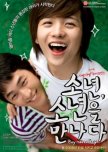
First step in a career in favor of LGBT people
'Boy Meets Boy' is a South Korean short film of romantic, musical, youth and LGBT+ themes, premiered at the 13th Pusan International Film Festival in 2008, and since then it has given a lot to talk about for several reasons: it was the first film work by Kim Jho Kwang-soo, the first collaboration between this filmmaker and the screenwriter Min Yong Keun, and presented for the first time Min Soo and Seok Yi, two characters that he would return to the following year to form the wedding couple of the short 'Just Friend?', also following up Min Soo in Love 100°, another short of his authorship, from 2010.Since then, the South Korean filmmaker showed signs of taking his time to weave the story with the thoroughness that has always characterized him, working like a craftsman in his eagerness to recreate every detail.
The director of 'The New Employee: The Movie' (2023) has spent almost two decades building an authorial block of unusual quality in the history of South Korean cinema, full of triumphs and very few mistakes. Throughout his work he has not only made important films, series and short films, but through them he has known how to rewrite the history of his country anchored to its most recurrent film themes and objectives: such as sexual awakening, most of age, sexuality, gender identity, being queer in a heteronormative and discriminatory society towards LGBT+ people and activism in favor of the rights of this group to which he himself has acknowledged belonging since 2006.
To film the short, he based it on Min Yong Keun's script of the same name about a love crush, in a festive and magical way. The film, without spoken dialogue, describes the relationship between Min Soo (Kim Hye Sung), a boy who loves photography and is gay, and Seok-Yi (Lee Hyun-jin), who seems a little tough but still manages groom to show your soft side. It also tells us about the indecision when it comes to expressing feelings and the need to be brave and go in search of love when it has arrived at your door.
Despite its short duration and the incorporation of music, dance and a magical fantasy, the viewer manages to maintain the common thread of the story in that elegant background of love at first sight.
At one point in the film, Kim Jho Kwang-soo, wang-soo, who collaborated with director Lee Song Hee Il to produce 2006's 'No Regret,' considered "the first real Korean gay film," and has shot others gay-themed works such as 'Two Weddings and a Funeral' (2012), 'One Night Only' (2014) or 'Made on the Rooftop', and the BL series 'The New Employee', introduces a fantastic character in the form of a fairy which comes to represent Min Soo's thoughts as someone who falls in love for the first time.
Despite not having dialogues, the filmmaker manages to make the audience identify with his characters, in addition to clearly establishing the relationships between them, through looks, gestures, expressions, body language and useful inclusion of the fairy (Yeh Ji-won).
The fairy symbolically represents the thoughts and feelings of the boy who has just discovered love for the first time in his short life: the nascent passion, the sexual awakening, the discovery, the acceptance, the insecurities, the fears, the worries, the fears, excitement, enthusiasm, innocence, naivety, and expectation, all in a mixture that explodes in unison.
With a palette of bright, festive colors, and corny and strident music to identify the fairy, but restrained and romantic to enhance the mood of the characters and set the tone of the film, the director guides us towards the discovery of love and sexuality in a new and unique experience for the character.
Of an autobiographical nature, the director himself stated that he based the story told in 'Boy Meets Boy' on his first love experience.
I liked the chemistry of the two protagonists, palpable from their first meeting on the bus. They are both adorably acting actors whose performances are enough to recommend watching the film.
Also highlight the use of Min Su's film reel as a symbol of love and life, by first representing the union of the two protagonist boys, and then serving as an invisible and conductive thread that, in constant movement, like life itself, unites all the characters.
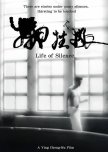
Brief and deep analysis of oppressed sexual minorities
Is it worth sacrificing the person you love and yourself to accept a lie? Can you be happy and make the woman you married happy, forced by family and society, since you have to hide your homosexuality? Can one decide who to love in a conservative society that considers romantic relationships between people of the same gender illegal and taboo?'Life of Silence'(The Life of Silence, Xi Sheng Zhi Lu - 犧牲之旅), Taiwanese director and screenwriter Ying Cheng-Ru's 2014 short film, explores sexuality through the story of three gay men entangled in two marriages doomed to failure.
At just over 26 minutes, the compelling and heartbreaking film explores the tensions between society's expectations and true happiness.
In the director's own words, silence usually comes with a backdrop, waiting to be shaken. A fiction and a reality. Three gay men and two marriages. When love and marriage cannot go hand in hand, how can marital happiness be achieved?
Interested in addressing social issues and sexuality, the filmmaker, with a master's degree in Fine Arts from the Department of Radio, Television and Film at Shih-Hsin University, brings us in this romantic drama a fiction woven into reality.
When there is a contradiction between erotic life and parental expectations, a difficult decision would have to be made. To rethink marriage, 'Life of Silence', a sequel to 'Body at Large', looks at oppressed sexual minorities. What is the Happy Family? Is there only one way to achieve happiness? Or should one be able to hug oneself freely?
The short film aims to show that human beings deserve happiness without barriers.
I recommend paying attention to the meaning of water, present throughout much of the footage, as a metaphor for the purgatory of an unfulfilled love, as well as the old man washing his long white hair in the final scene. This older man, whose face cannot even be seen, represents the spirit of previous generations who were never allowed to love and who died alone.
As the director himself expressed: "The old man is another reason to inspire me to film this film. He was born at a conservative age, sexually repressed, he did not have sexual relations for life, I left him as a reflection of the actor, if love is repressed, and is finally left alone and desolate.
The lead roles fall to Jason Lai as Chen Kai Cheng, Hsueh Yu Ting as Chin Yung Sheng, Lu Yi Ching, Chiu Min Chia and Liau You Ching
With touching and at the same time nostalgic background music, it manages to validate the characters' feelings of loneliness and melancholy.
With the use of a dark color palette, especially blue and ocher, and mostly black and white images seeking cinematic perfection to emphasize the contrast between light and shadows, and surprising professionalism in the use of lighting, 'Life of Silence' conveys the suffocating, overwhelming atmosphere, and an atmosphere of sadness, melancholy and tension.
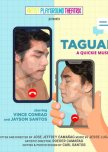
Declaration of love in times of pandemic
Cinema has always managed to create wonderful worlds, fantastic scenes and perfect dialogues where feelings and words combine in an ideal way to express the very essence of love.Each couple in their personal history has a movie, a scene or a soundtrack that is part of their memory, moves them or makes them exchange knowing glances because it evokes special and unique memories.
There is nothing more powerful than a good love story brought to film or television, and a script full of witty and emotional phrases that support it. Whether they are spontaneous gestures, proposals for a hand, or cathartic moments that change everything, declarations of love are the best way to consolidate a romance on the big or small screen, and to bring the audience to the brink of tears.
Written and directed by Jose Jeffrey Camañag, the Filipino short film 'Taguan, A Quickie Musical' presents us with a declaration of love between two boys in the midst of the pandemic caused by Covid-19.
Also known as 'Taguan, Secrets Kept' and released on May 30, 2020, the audiovisual, of the Romance, Yaoi, Comedy and Musical genre, shows us the telephone communication between the two best friends Tristan (Jayson Santos) and Chris ( Vince Conrad) who, forced into social isolation or home quarantine, are locked in the confines of their homes.
Between drinks of alcohol and tears, Tristan calls his best friend by video call to confess a secret that he has kept deep in his being for years. This is how the musical narrates that very special online video chat of two teenagers who, during quarantine, realized that they wanted to end their friendship... to be more than just friends.
The protagonists perform three songs in the almost 15 minutes of their magical transition from friendship to something deeper. The songs are "Ganito Pala", "Munting Ala-ala" and the title song of the short film: "Taguan".
With spoken lines and Filipino music in the voices of the two protagonists, 'Taguan, A Quickie Musical' was created through a novel program from the Artist Playground company, called Artist Playground Theatrix, a new form of visual and auditory performance art that uses the latest in technology that combines musical theater and film in its final production.
The team behind the audiovisual is made up of award-winning creatives and entertainment industry experts. The narrative, script and lyrics of the songs were created by José Jeffrey Camañag, filmmaker who won the Live Entertainment Awards and festivals as Best Director.
The music is by multi-award-winning maestro Jesse Lucas, while the editing is by Carl Santos, the artistic direction is by Roeder Camañag and the project director is Paul Jake Paule.
In the midst of such a long pause that led to the cancellation of premieres and filming and the confinement of actors and film production experts to preserve their lives, short films like this came to experience new concepts and executions never before made.
Challenging themselves to do something new, they managed to create and produce virtually so that the cast and crew could stay healthy and safe amid the pandemic. The writer and director never physically met the rest of the creators and artists during the filming process. Camañag managed the talent remotely. The two protagonists not only act, but are also filmed at home.
In this way, the project is one of the highest-profile cases of a filmmaker seeking to adapt production to the demands of the global health crisis. While hundreds, perhaps thousands of films and television shows in the Philippines and around the world saw production halted to protect actors and crew during the pandemic, Camañag produced and gave us 'Taguan, A Quickie Musical', a play simple, but with an intelligent and timely dialogue, marked by the circumstances that humanity was experiencing at that time.
Jayson Santos and Vince Conrad are a revelation, two incredible actors and singers that I hope to see again on other shows.

A series that leaves more questions than answers
'Bro and Me' (家教哥哥來我家) is a Taiwanese BL and LGBT+ themed miniseries of 8 episodes each lasting about 5 minutes on average. Starring in its main roles JN Yu as Jie En and Xie Yi Hong as Ye Hong, the plot shows the romantic relationship that arises between two heterosexual boys, one a high school student and the other, his tutor, whose lives will be altered once begin to live together under the same roof and in the same bed, after the second is hired by the first's mother. Filmed in 2019, in locations in Taipei, the series, of the comedy, romance and yaoi genre, was broadcast between September and December 2019 on Vidol TV, obtaining a notable commercial impact.Argument
This sweet story of love and friendship introduces us to Jie En, who since he was a child dreamed of being as cool as Ye Hong, the boy 5 years older who lives next door. Immersed in his own routine, Ye Hong pays attention to Jie En just to have fun by teasing him from time to time.
As he grows up, the innocent and sweet-tempered Jie En sees in the cheeky and daring young man everything he has always wanted to be and secretly admires his neighbor as if he were his older brother.
In this romantic drama directed by Chen Mengwei we see how after Ye Hong leaves to study abroad, Jie En is devastated. He has lost the person who served as a reference in his life. However, you will soon have other reasons to occupy your thoughts: the pressure of getting into a good university forces you to focus solely on your studies.
Wanting only for her son to be able to study for a career, Jie En's mother, now 17 years old, announces that she has hired a tutor who, after graduating abroad, has returned and will move in with him to dedicate all his time. time and effort to ensure that his disciple obtains a good result in the exams.
If at first Jie En was insecure and even upset at having to share his house with a stranger, he will soon be furious when he realizes that the tutor is none other than the boy who has always made fun of him. However, both will live pleasant and happy moments under the same roof.
Living with Ye Hong brings joy to Jie En, at least until he discovers that Jing Han, the girl he has befriended in Ye Hong's absence, is actually Ye Hong's first love.
When Ye Hong's bed breaks, Jie En is forced to share his own with his tutor. One night, while the student is dreaming about Jing Han, he caresses Ye Hong's face, who, confused, believes that the boy has feelings for him. From this moment on, he changes his attitude towards Jie En and instead of mocking him, he will show unexpected affection.
This is how, suddenly, Jie En's life is altered again, now involved in a tangle of complicated relationships, misunderstandings and confusing emotions. Will the world make sense to him again?
Jing Han, who has understood the feelings between the two boys, acts like a fujoshi determined to match friends, and, to top it all off, adds a third to the already hectic dynamic between Jie En and Ye Hong, after proposing that they receive each other. his handsome friend, Xu Shaoyu, who has nowhere to sleep as his apartment is being renovated.
Will he come with the intention of breaking up the relationship in the event that Jie En falls in love with him?
From Jie En's perspective, will the unexpected visit be used to make Ye Hong jealous so that he decides to declare his love for her? Why does she accept the new guy's flirtation? Doesn't he seem to be very happy in Xu Shaoyu's presence?
That night the three boys must share the same bed. Waking up in the early morning, He Yong pulls back the covers and sees Jie En hugging Xu Shaoyu. Has he dreamed about Jing Han again and that's why he hugs him like he caressed him some time ago? Has he lost the affection of the young student? Have you ever loved him? Has it all been a product of your imagination?
The next day, after the visitor leaves, He Yong tries to talk to Jie En, but at the last minute he stops the impulse and remains silent. In the morning, Jie En discovers that the tutor has abandoned him.
In a series that leaves more questions than answers, it concludes as it begins, with the arrival of someone at Jie En's house and he, on the threshold, smiles and asks with disbelief, but marked surprise and undeniable joy: "So... you're the new tutor my mom mentioned?"
Although it is true that it is not shown who the tutor is, everything seems to indicate that it is none other than Ye Hong, who returns after abandoning Jie En. The long, thin, bony fingers are the same ones that ring the doorbell in the first episode. Furthermore, the newcomer drags the suitcase, as Ye Hong did upon his arrival, and not the backpack hanging on his back in which Xu Shaoyu usually carries his belongings.
The story is solid and the protagonists play their roles well and have the potential to act in BL series, as can be verified in their respective filmographies. With well-developed characters and events, a good boy love series could be achieved.

The end of the trilogy: reasons for debate and controversy
The trilogy by Korean director Leesong Hee-il, known as 'One Night, Two Days', (백야), began with the short film 'One Night, later expanded to a 75-minute film entitled 'Baekya' ('지난여름, 갑자기 '/'White Night' and followed by the short 'Suddenly Last Summer' (지난 여름, 갑자기/'Jinanyeoreum, gapjagi'), concludes with the medium-length film 'Namjjokeuro Ganda' ('Going South' /남쪽으로 간다), all from 2012, and narrating three unconnected gay-themed stories together.The strength of Leesong Hee-Il's cinematography, by itself, and continually, finds an audience for his works. Not only because of the naturalness and simplicity, at the same time as the complex way of exposing homosexuality and human relationships and conflicts, which allows us to reinterpret the essence of the South Korean LGBT+ collective (equally global), from the perspective of some of its representatives, but also in the elegance of the language, the cinematographic resources, the intelligence of the film narrative and the intellectual and human wisdom that flows with astonishing clarity and directness.
It is, furthermore, and above all, the director's ability to build powerful stories due to their humanism, which penetrate the personal imagination, especially of the members of said community, never to abandon it again.
Who who has seen the trilogy does not suffer as their own the desperation and anguish of a gay person who drags, like a heavy burden, the emotional and spiritual suffering, more than physical, caused by a homophobic attack and today, after years , returns to the scene of the events to continue judging the society that did nothing to condemn barbarism, only for the fact that the victim is a homosexual? Who has not wanted to be the companion of said person in the search not only for love, but also, and above all, for the necessary spiritual peace and answers that give meaning to their life, during a long, cold night in Seoul?
Who was not on the cruise ship that crosses the Han River while a boy, a minor, blackmails his teacher, 17 years older, whom he threatens to get out of the closet if he does not give in to his demands to spend a few hours on a hot day in his side? Who has not understood the dilemma in which the teacher struggles, caught between desire and responsibility, between desire and ethics, between good and evil? Who has not forgiven the student for blackmailing the teacher, after seeing him suffer and at the same time shout his love and happiness, while, excited, he talks to the fish or makes the teacher listen to his favorite music after placing the headphones over his ears? ears? Who has not made their own the suffering, pain and anguish, but also the joy and the touch of happiness, of each and every one of the characters that inhabit their stories?
'Going South' follows two men on a journey that, despite the short's title, has no defined direction or destination. Gi-Tae (Kim Jae-Heung) and Jun-Young (Chun Shin-Hwan) met during their mandatory two-year stint in the Korean army. From the first seconds, the existence of a secret to be revealed around these two people and their respective internal struggles becomes evident.
Its director once again exposes a constant dichotomy in the relationships of its protagonists, but now elevates it to a higher plane by placing its narrative heroes involved in the South Korean army. Shocking are the deeply subtle, uncomfortable, and highly problematic questions it raises about homosexual relationships, military service in particular, and that nation's society as a whole.
While Jun-Young, now demobilized, hides or completely denies his homosexuality, Gi-Tae, who still has some time left to graduate, is not afraid to acknowledge it and even enjoys celebrating it, despite completing his military service in a nation where, according to article 92 of its Military Penal Code, it considers sexual relations between members of the same sex as "sexual harassment", punishable by a maximum of one year in prison.
Jun-Young is taking Gi-Tae back to base after his last leave. The atmosphere around them is overloaded by the demands of one and the refusal of the other to give in. Jun-Young is quite harsh on his friend during the ride.
The characters in the medium-length film inhabit a space where they meet somewhere in the middle. It is at this moment that the director uses the camera lens to "steal" the characters' emotions and show human complexities.
One having realized that he does not want to continue the sexual relationship with his friend and asks him not to contact him again, the other is not willing to let him go, and clings to him. Inadvertently, the soldier takes the opportunity to put sleeping pills in Jun-Young's coffee. As soon as the drugs take effect, he takes the wheel and heads south, or nowhere in particular.
When Jun-Young finally wakes up, he is furious, but also furious is Gi-Tae, who confronts his former lover/friend about his broken promises.
The fight, both emotional and physical, reveals two aspects to consider: on the one hand, Jun-Young completely denies not only his former feelings for Gi-Tae, but also his homosexuality. Jun-Young dismisses his previous relationship, alleging that he had sexual encounters with his friend out of the need to fill the void of soldier's loneliness, something common for soldiers while doing military service.
And secondly, Gi-Tae is clearly losing control and has crossed the line. His erratic, illegal behavior is not justifiable, and yet we sympathize with him more than with Jun-Young, because his pain is so tangible.
Initially calm and serene, Gi-Tae's feelings are increasingly expressed through physical things, such as photographing Jun-Young in the middle of making love for the last time, not to blackmail him but to materially record the feelings that his lover does not want to admit with words. He subsequently gets into a wild mud fight with Jun-Young that nearly ends in blood and he drinks bottle of beer after bottle. His state of increasing intoxication leads him to dance alone like a lunatic in a dark highway tunnel, while music blares from the car speakers.
You can't blame Jun-Young for wanting to distance himself from Gi-Tae, who has major emotional issues that may run deeper than this particular rejection. And yet, one must ask: how desperate must one be to go AWOL from one's military base and nearly kidnap another person, acts that can only have serious repercussions?
Open-ended like all parts of Leesong Hee-ill's trilogy, 'Going South' feels more gloomy and suffocating than the two previous films, denying the viewer a journey towards the spiritual peace and happiness they dreamed of, at least from one of the characters.
As in the rest of the three pieces, the film tells a story of great visual and auditory beauty, but perhaps the most important thing is the emotional depth. The raw honesty of the film's narrative – centered on the often deeply problematic feelings of its characters, all asking difficult but very real questions – is commendable.
The finished compositional gear, the composition between musical form and film text brought to the screen, the treatment of time and changes in point of view, are formal innovations that demonstrate the filmmaker's vocation to always renew himself, supporting the three pieces that make up the trilogy, which reflect on the human condition, the complexities of the human being, the responsibilities and ethics of the gay man of our days, the homophobic ambushes that stalk him at every step, the feeling of emptiness caused by the so-called epidemic of loneliness gay, the emotional and mood disorders of homosexual men, the constant search for happiness, which implies, in turn, the fight for their human rights, and the encounters between the individual and the collective.
Note: The reviews of the remaining pieces of the trilogy, in MDL, can be found on the page dedicated by the virtual platform to each of them.

Speaking in baseball terms... this is not your thing
Phukan (Akarawat Prathumthong), Paper (Natthaphak Witsiri) and Bell (Sasikarn Singsi) are students at the Faculty of Architecture, Art and Design. To complete an assigned task, they must join a team of three people to develop a school project together as part of the final evaluation of a subject.Phukan will confess to his friend Bell that he is attracted to Paper, but is not sure whether or not he should declare his love, but he will soon discover that the boy has also developed feelings for him.
The first question one must ask is why there are few students in a classroom at one of the Thai Colleges of Architecture, Art and Design. And from this question, others arise: how in this short, which has no great pretensions, are the two main boys, especially Paper, much more handsome and attractive than his study partner, not perceived as attractive people by their colleagues? feminine? Why aren't they popular with girls? How is it possible that there isn't a fight between the few females in the classroom to have them on their respective teams? Only Paper's table neighbor will invite him, very timidly, to join him, but most likely it will be for the comfort of sharing nearby seats. While Bell, obviously, is already a duo with his friend Phukan, so the only thing missing is the incorporation of another person to make up the required shortlist.
If they are already assigning tasks, it is assumed that the course, even if it is the first year of the degree, has already made some progress. Anyway, by now the students should know each other, at least by their names. How is it possible that they have to resort to text messages in a digital chat to know how to call each other and also serve as an introduction to the viewer?
While they visit museums, exhibitions and art galleries and write the assignment, without the viewer realizing it, which demonstrates the little connection achieved between him and the characters, Phukan's love for Paper blossoms, only to discover that the latter has been loving him for some time. secret.
The actors in 'As Always', a short film by Thai filmmaker Patcharaporn Thiangsantia, do not achieve the necessary control of their bodies and voices to convey the emotions of their characters. Theirs are not empathetic characters, capable of allowing viewers to connect with them and their experiences. The audience does not feel and understand the emotions of the characters, so the emotional connection is null and void. This is where the failure of the audiovisual lies, in addition to its poor script.
Positive emotions such as joy at discovering love (another emotion), humor and happiness (as ways Bell reacts when learning about his friend's sexuality, or when the two boys mutually declare their love for each other), are not transmitted; nor negative emotions such as anxiety, sadness, insecurity, fear of rejection. Likewise, ambiguous emotions, such as surprise at being reciprocated, and hope, are not externalized.
In this minor work of the BL universe, repeated clichés, boring scenes, a non-existent chemistry between the lovers, and childish actions, are its main characteristics in a romance with little to prove to fans of the genre.
The short lacks a convincing plot and shows little imagination, contributing little to the genre, which has come a long way in recent years; If anything, the discovery of two new and potential talents within the BL, but with a lot to polish, as well as demonstrating the rich architectural and plastic arts culture of Thailand.
If what you are looking for is a declaration of love of fireworks and butterflies fluttering in the stomach, of those that are born under the influence of emotions, intoxicated with the nectar of the first months, those in which the loved one seems to be a perfect being and hormones awaken the most lively and intense passions... I repeat, if that is what you are looking for, speaking in baseball terms, pick up the bats and balls and turn off the television, this is not your thing.

In defense of bromance
The two protagonists of the Chinese short 'A Little Romance', from 2022, by filmmaker Mao De Shu, do not establish a bond like that of Chandler and Joey in 'Friend', Batman and Robin in the 'Batman' saga, Ben Affleck and Matt Damon in films like 'Air'; Riggs and Murtaugh in the four 'Lethal Weapon' films, or Jack and Danny in the British comedy 'Big Boys'.Chinese filmmakers, great specialists in telling stories in which their protagonists move in that social space for emotional openness, beyond other traditional male relationships, achieve films characterized by the absence of barriers and judgments, providing the characters with high stability. emotional, social fulfillment and better conflict resolution than a traditional romance. Chinese creators strip the bromance of all the prejudices inherited from toxic masculinity, especially that which suggests that you are no less of a man for having great trust and intimacy with your best friend.
There are those who say that a bromance is better than a couple. Well, this is a question for everyone. Let's leave it at that they are different relationships, very different from each other. The truth is that Chinese filmmakers know the public's tastes perfectly. That is why they have plenty of stories in which the protagonist takes great care of his friend, and in this way the friendship becomes longer and unconditional.
It is not that they turn their backs on the classic romantic relationships, homosexual or heterosexual, but that they leave it to others to bring to the screen everything related to the "game of conquest and seduction", knowing that there are other encounters and disagreements. This has influenced the mentality of many viewers who go so far as to affirm that a bromance is more beneficial than a relationship, and add that it is nothing out of this world either: friendship over love is something that is quite internalized in the human being.
The Asian giant's filmmakers have made it their own, like few others, to reflect stories whose main characteristic is that of two people, usually of the same sex, who can share personal problems or secrets that you would not share with others. Mutual respect and trust built over years allow them to express their emotions and feelings more openly, while reaching out to physical displays of affection, such as hugs and kisses, even in countries where these are not the common norm.
A good friend will point out without mincing words all those habits that seem normal to you but are quite toxic. He will listen to you when it comes to coping with your failures whether in study, work or love failures. Nor will you have to ask him for comfort or advice. Just by looking at you, he will know what you need and he will lend his shoulder to cry, and he will cry with you. The good friend will fail you in your least inspired moments with your partner. Should I give you more reasons? If you already have a bromance, surely not.
Mao De Shu is known for filming bromances since he became known with his first short films in 2015, through the dramas 'Long For You' and 'I Cannot Hug You', in 2017 and 'I Cannot Hug You 2' , 2018, among others.
But, as I said before, the two protagonists of 'A Little Romance' do not stop at the level of outlining male friendship in the era of new masculinities. They are not only the best confidant friend with whom you can talk about what worries you most, your family and romantic relationships, the mental illness of a family member, the chaos of the world we live in, the last soccer game, the precariousness work, lifestyle expectations, our role in gender equality or in the fight against sexist violence, homophobia and for the rights of LGBT+ people.
Liu Wen and Song Xian's relationship involves, above all, sexual attraction. Therefore, it's not bromance. Although in recent years the magic of a good television couple has been lost, possibly due to the compulsive consumption format, it has been absolutely perfect to see these young people how, little by little, and shown in a suggestive way, they are giving themselves realize that they like each other. This is the great beauty of bromance.
The greatest success of the film is the casting. It features two actors who couldn't fit better in their respective roles. From the first moment, Liu Yao Wen and Song Ya Xuan show that they are Liu Wen and Song Xuan. While the former exudes charisma from all sides and stands out in the most comical aspect of the character, which is quite present in the film, Song Xuan is a dramatic revelation, adding emotional weight to the story.
Both actors are perfect for their roles. At their most strategic and professional, they have the ability to trust each other and support each other, to reflect a symbiotic relationship between them.
The director of the short is aware that anything that did not contribute to understanding what the two young people are experiencing and their journey together of self-discovery and acceptance, did not make sense to be in the final cut. The important thing is them, and nothing else. His screen time is the entire movie. It's the movie itself.
In general terms, the plot leads its characters to reasoning such as "You may look better when you smile", or even its own plot, which revolves around the need to look for company and someone who gives warmth and joy to our lives, especially if they are people who for different reasons live alone.
The film adheres to a theme that love story fans really like, 'enemies to lovers', to narrate the relationship between two young people who have a lot in common, but have not gotten off to the right start, until a One day one comes to the other's defense when some bullies try to harass him. The friendship that suddenly arises between the two will become more and more real, evolving into a romantic relationship without becoming sexual.
The chemistry between the protagonists is shown naturally, palpable, tangible, in their looks, in their body language, the small winks, the flirtatious smiles, in the moments of tenderness that bring them closer and reproduce that sensation so recognizable by queer people of the secret love.
The spark is lit from their first scene together in the store when Liu Wen understands that the customer is from out of town and speaks to him in his dialect to communicate, and they frolic playfully in the next encounter when Liu Wen runs into the classroom right after be introduced Song Xuan as the new transfer student. The close bond between the two artists in real life jumps onto the screens and takes shape to allow us to appreciate it.
The film moderately addresses the sexuality of its protagonists, but manages to convey their playful passion and does not omit the main characteristics of the two boys as they build their relationship, first friendly and then loving, reflected in an insinuating way.
The little more than 15 minutes of footage will be enough to see how the relationship between Song Xuan and Liu Wen develops very quickly, barely giving the story room to breathe... for us to breathe.
Beyond how hopeful it is and the sighs that its protagonists will provoke, the most valuable contribution of 'A Little Romance' is its inspiring message about coming out of the closet in a process of self-discovery and falling in love without hardly showing the internal conflict of the characters. .
There is no doubt that Song Xuan and Liu Wen will continue to make thousands of people around the world fall in love, especially lovers of yaoi and romantic drama.
In a new type of fairy tale, Song Xuan, who plays the good, studious and neat boy who always respects the rules, especially the one that prescribes not skipping classes, thus earning the jealousy and envy of some , and Liu Wen, an out-of-control human whirlwind, willing to pick a fight with anyone in his "gangster mode," and suddenly he appears and turns everything upside down, changing both of their worlds forever.
In the film, its director gives complete freedom to the actors in front of the camera. It doesn't make cuts in between. Overlay one image with the other. He points the camera at them and lets them play. And in that game, magic happens. Thus, the public is able to understand, without words or physical manifestations, such as the theft of a kiss or holding a hand, what is happening with these two young people on a physical level and, at the same time, communicate what is going through their hearts. heads and what they experience emotionally.
The quick images tell, along with Liu Wen's voice, how the relationship deepens as he takes Song Xuan, on foot or by bicycle, to the places where he went to play as a child. This is how he shows him the tallest tree, the longest road, the restaurant with the most delicious stew, the fireworks, the sun, the moon and the stars on the seashore.
Liu Wen will give Song Xuan courage to face the bullies she once feared, as well as reasons to laugh. He won't mind losing the Student of Merit award. His intuition tells him that he should be there, for Liu Wen, even if he has to miss the exam.
Although the story only covers the phase of consolidation of friendship and the beginning of the construction of romance, the final words and images testify to the romantic interest of the two boys.
Both will be able to see the sun at night. And in the future they will leave Chongqing and go to Beijing, Shanghai or anywhere to look at the bigger world, but the deal only imposes one condition: they will take the trip together… holding hands, always together.
Will Song Xuan's wish to stay longer in one place come true? The only thing I can be sure of is that I close my eyes and see how every morning, before sunrise, under that endless tree at the foot of the long, winding staircase, Song Xuan standing there, in the favorite place of the people. two, with a smile on their lips, waiting for their lover.

A poorly “parked” relationship on the race track
Cinema and television, like all art that reflects the society in which they develop, have shown the trafficking of children through notable films, documentaries and television series. Numerous films and television programs expose this illegal practice and many of them are based and inspired by real-life cases.Asian dramas are committed to bringing all genres to the public, including those in which their protagonists have a romantic bond combined with supernatural powers.
Has the fact that Thailand is a point of origin, destination and transit of human trafficking aroused the interest of Nopachai Jayanama (Peter), as director, and Kanokphan Ornrattanasakul and Issaraporn Kuntisuk, as scriptwriters, to tell us in 'Pit Babe' a story that mixes homosexual romance, sport, intrigue, action, human trafficking, fantasy and supernatural powers?
This drama, an adaptation of the web novel by _alittlebitch, winks at Thai reality: the value of child victims of human trafficking does not lie in using them as sexual slaves, in forced labor or to extract their organs for commercialization, but in possessing special powers.
Are we facing a social drama of denunciation of human commerce? I would like this to be its purpose, but consistent with its BL condition, 'Pit Babe' will enhance the romance. This arises between Babe (Naret Promphaophan-Pavel), the king of the racetrack, and Charlie (Krittin Kitjaruwannakul-Pooh), his supporter.
Will the series have a hidden message? How many of Tony's “sons” among the superpowered children are gay men today? Babe, Charlie, Jeff, Kenta, Pete, Way...? That is, the main characters with powers who were raised-educated by the person dedicated to human trafficking ended up being homosexuals. Is there a hidden message in this, simple coincidence or something of “destiny”?
Babe is a very popular racing driver and admired by everyone. His achievements in the sport have led him to be considered number one. Among his followers is Charlie, a young man who wants to be a racing driver like him. However, he does not have the money or the contacts necessary to achieve it. Therefore, he looks for an opportunity to get closer to the leader of X Hunter. When he succeeds, he asks for your help and to lend him a car so he can materialize his aspirations. The only solution he can think of is to reach a strange agreement with Babe. Against logic, he agrees to help Charlie realize his dream.
On this journey, will Babe be able to win Charlie's heart? Will he lose the race he most wants to win this time? Will Charlie be the one interested in captivating the racing driver? Will the relationship that began as a game triumphantly cross the finish line to become a real romance?
The most notable thing about the series is its exciting scenes and the attractiveness of the actors.
There is a secondary couple, made up of Alan and Jeff.
The cast also includes Supanut Lourhaphanich (Nut), as Way; Obrnithi Leelavetchabutr (Ping), as Pete; Natthapong Pathong (Benz), as Kim; Asre Wattanayakul (Lee), as Dean; Hemmawich Khwanamphaiphan (Sailub), as Alan; Thanapon Aiemkumchai (Pon), as Jeff; Michael Kiettisak (Michael), as North; Pataraphol Wanlopsiri (Pop), as Winner; Pantach Kankham (Garfield), as Kenta; Supakorn Saokhor (TopTen), as Sonic; and Vorarit Vaijairanai (S), as Tony
The chemistry between the protagonists and the bed scenes fail to lift a series whose characters are unrealistic and undeveloped. Pavel and Pooh have charisma and are attractive, but the script does not help their relationship connect with the viewer.
I must clarify that it is not that I find being 'passive' degrading. It's not that I assume that, in a relationship between two men, there is a "superiority" on the part of the one who is 'active' compared to the other who is 'passive', but the abrupt change in Babe's personality seems inconceivable to me. . This transformation comes at the same time as the loss of his powers, at the hands of Charlie.
Babe abandons his well-crafted playboy image for years. In all his previous relationships he played the role of seme or asset. In the words of the BL series themselves, he was, of the two, “the one on top.” He began his relationship with Charle by assuming this role in bed. Suddenly, without a convincing explanation, Babe becomes Charlie's uke. Babe swaps to play the role of the “bottom.” So, you would have to ask yourself: Did the loss of his precious powers lead him to be the passive one in their relationship? Didn't this move cause a loss in his character's potential?
Despite being in front of the cameras practically all the time, the actor who plays Charlie fails to connect with me emotionally. They are not facilitating emotions, but hindering emotions that are transmitted to me by a character who fails to sensitize me. By not feeling or understanding Charlie's emotions and feelings, I cannot essentially grasp whether it is love or just sex that drives him. Only his acting stands out in the sex scenes. Note that I do not say “when making love.”
The transformation of the character played by Nut, already in the final moments, is not logical either. About an obvious thing, the incurable remorse that must have accompanied Way throughout much of his life for betraying Babe for years, causing the rift between him and the man he loves, as well as many, if not all, of the problems that have hit to the positive characters by being infiltrated into their ranks, Way's evolution from evil to purity, from darkness to light is narratively constructed, sustained by the effort to achieve the viewer's identification with the traitor. It is necessary to save it, the creators thought.
Way drinks with Pete because “he wants to make the situation better.” He doesn't know “what to do next.” He does not know if “what I have always believed is the right thing.” He asks Pete why he decided to leave Dad, and Pete tells him, “Because the truth is not what I thought… I decided to leave to end the vicious cycle that Dad had created.” And he tells her that she still has the chance to choose what she wants to do. Way has been asked to show the despondency caused by guilt. Way has had the option all his life to choose the right path, but he has decided to be by Tony's side, even knowing what this means. But suddenly, some words from Pete whispered in his ear between sips of liquor and a few pats on the back invite him to “do the right thing.” And this would not be a problem if they had gotten rid of the rampant schematism in the character design and the all-too-evident desire to redeem him.
A story that fails to convince, clumsily designed characters, characters lacking development and therefore generating empathy, limitations in the explanation of the characters' decision making, poverty in the development of events and irregularities regarding changes of personality, are several of the main characteristics of the drama.
Peter throws together a few tropes and too many clichés. With fewer ambitions and fewer plot holes, perhaps the series would have become a full-throttle, full-speed car swallowing up the race track.

A tribute to a pioneering figure in Taiwan's LGBTQ+ community
When they go to visit Mickey, their terminally ill former English teacher, two men and a woman remember their youth, when they began their friendship during their high school years.After saying goodbye to the sick man, they return to the old intensive school to remember their years of study and their rebellious youth. Suddenly, quickly, colorfully and festively, the story goes back in time, to 1994.
At this point in the footage we have been identifying the main characters of the Taiwanese youth romantic drama 'After School', from 2023, by director and screenwriter Blue Lan, about coming of age.
Cheng Heng, the main narrator, is a teenager and only child who aspires to be a filmmaker, although his father insists that he study mathematics to become a teacher. Enrolled in Success Cram School, he takes remedial lessons to help improve his grades. However, instead of paying attention to his studies, he spends most of the day interrupting lessons and playing pranks, such as calling the school secretary, using his voice to make sexual advances, or setting fire to the school and provoking a fire with the consequent evacuation of students, teachers and administrators.
Cheng Hsiang is Cheng Heng's friend and also a troublemaker. He is the typical cute boy in the class, and many of his classmates dream of being his boyfriend, with the exception of the class beauty, Chen Sih, whom Cheng Heng has a crush on.
In addition to games and studies, the two boys share a bed in Cheng Heng's house, since his parents have taken him in, knowing of his poverty. They practically do everything together, from sharing a toothbrush to joking about their dirty, semen-stained underwear.
Ho Shang, an obedient and rule-abiding student, is the third in the company, known as the three musketeers of success, although not always of his own free will. Son of Wang, the director of the intensive school, is dragged by the two best friends in their misdeeds. We will soon learn the reason: when the exasperated principal wants to expel Cheng Heng and Cheng Hsiang, his wife will remind him how Ho Shang, in elementary school, was bullied by the older students, and the duo always protected him.
As we anticipated, Cheng Heng believes that studying at school will allow her to be close to Chen Sih, a girl with a strong character who defends herself. However, Cheng Heng is too nervous to ask her out.
With a main arc in the usual teen romantic comedy style, we follow the friends in their teenage pranks, falling in love and family relationships, used mainly for laughs, in an approach that takes up most of the film's 124-minute running time. .
Based on true events, when Mickey, a new substitute teacher with progressive ideas about teaching and society in general, takes over the classroom, the two young people discover a mentor who finally offers them proper guidance about their lives, by talking to them about romantic relationships and sexuality and teaching them to understand homosexuals and themselves.
Mickey openly addresses issues of sexuality education in the classroom and beyond, and encourages his students to think freely. Upon learning that he also dreams of being a filmmaker, Cheng Heng will admire the professor even more and will have him as a role model, interested in adopting his rich philosophy of life.
An embarrassing home accident causes Cheng Heng to suffer a burn in his groin. This will be the reason why students begin to speculate that Cheng Heng and Cheng Hsiang may have a romantic relationship.
However, this same event will also serve as a pretext for Mickey, aware of the rumors, to offer advice and guidance to a student who is currently going through a period of doubts and insecurities regarding his sexuality.
Meanwhile, Chen Sih begins dating the trio, Ho Shang fights with his parents over his two friends, Cheng Hsiang experiences a homosensual awakening, and Cheng Heng becomes more open to sexuality under Mickey's positive influence.
Michael's appearance permeates an atmosphere of freedom and fun. In truth, his dream is other than working as a teacher. The "awakening" he will generate in the students, in completely different directions, that eventually occurs due to his influence, takes the narrative down a completely new path. The story unfolds in a surprising way, this being one of the best aspects of the entire film, which should definitely be attributed to the way Blue Lan handles the twists.
At this point, the comedy transforms into drama, which reaches greater intensity as the story progresses, to the point that the last part, which also returns to the opening scene, borders on the melodramatic. Although this last aspect does not always work well, the truth is that 'After School' never abandons its intention to entertain.
At this point, multiple LGBTQ+ characters and stories are introduced into the story. The film puts homosexuality in the spotlight. However, despite exploring many relevant topics with the goal of educating and raising awareness among viewers, the stories barely scratch the surface instead of highlighting complex experiences. On the other hand, for the moment they perpetuate superficial stereotypes.
There is an excessive abuse of melodramatic scenes, especially when Cheng Heng's parents catch their son watching a gay porn video (which causes the incident noted above) and then catch him in a pose that suggests he is kissing his friend, for example. which his parents overreact while crying, lashing out at the two boys, condemning their son and expelling Cheng Hsiang from the house where they took him in.
The director, Blue Lan, seems well-intentioned. He dedicates his autobiographical film to Mickey Chen, his real-life mentor, an esteemed figure and pioneer in Taiwan's LGBTQ+ community. 'After School' pays tribute to someone who was instrumental in producing documentaries focused on queer and gender issues, actively participating in street protests advocating for equal rights for gays and lesbians.
Kipo Lin's editing results in a fast and fairly adequate narrative, although the extensive flashbacks to scenes already presented could have been avoided.
Comments on LGBT rights in the country of the time are quite frequent, without ignoring the simplicity of the messages and not describing gay issues with sufficient nuances. Even so, they address problems such as the pressure that adolescents felt in the 90s of the last century from their parents (they still suffer today) to succeed on the "correct" path, that is, the heterosexual one, the heteronormative, interpreted as studying in a good school, being able to enroll in the best university, getting an excellent job after graduating and getting married and having a magnificent family, especially with many children.
In that conservative and heteronormative society, concepts like homosexuality definitely have no place. Much less homosexual marriage, recognized only in the country 25 years after the events narrated in the film.
This approach adds depth to the story and reinforces the film's positive intentions, although the overall attitude here remains "light" to the point of becoming idyllic at times. In general, Blue Lan does not significantly lose its sense of measure.
The performances fit perfectly with the narrative style of the story. While the character played by Zhan Huai Yun exhibits impressive chemistry with Chiu Yi Tai's Cheng Hsiang, who is equally good, also in the way he handles his coming of age, even though the former's role is reduced to that of best friend.
Charlize Lamb as Chen Sih provides the necessary female element in the story as a bone of contention who eventually shapes the lives of the young people as well, in another quite attractive presence in the film.
Blue Lan himself plays Cheng Heng quite convincingly, both in the humorous and dramatic moments.
While Hou Yan Xi as Mickey is excellent in the role of the progressive teacher/mentor, Chien He Wu as Ho Shang promises a meatier journey, stealing the show at times, particularly after his transformation, when he finally spreads his wings. and he dares to fly without caring about his father's prejudices, but there is not enough development of his character and his conflicts.
On the other hand, the convincing bromance between Cheng Heng and Cheng Hsiang delves into romantic territory when they share a moment of intimacy, but the result does not meet the audience's expectations, failing to delve into feelings or portray the romantic nuances of the relationship. Despite addressing LGBT+ themes, the film avoids telling a homosexual love story. The cinematography follows brilliant paths, in an approach that coherently adapts to the narrative.
'After School' lacks a good script. Its poor writing reiterates all the predictable tropes. Sentimental messages fail to strike the viewer's nerve. We have seen this film about rebellious young people and mentors who guide their students on other occasions with better results.
The film highlights the importance of finding a mentor in life, a guide and educator that young people can look up to.
Mickey's arrival in the classrooms also eventually moves in the same direction of providing moments of reflection, but also of fun, adding to the narrative of the film, but the "awakening" of the young people, in completely different directions, which eventually occurs With the teacher's help, he takes the narrative down a completely new path. Frankly, the way the story unfolds is as surprising as it gets, in one of the best aspects of the entire movie, which should definitely be attributed to the way Blue Lan handles the twists.
Despite being cliched and cheesy at times, 'After School' is still a very entertaining film that manages to present its commentary eloquently, although its greatest feature comes from the fact that it will repeatedly leave the viewer with a smile on their face.
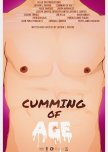
Gay sex and artistic orgy
Writing a literary text in which young gay people participate in an orgy is difficult for Augustus Vera, or just Age, as he likes to call himself (played by Jason Maghacot), a young aspiring writer. He knows it very well, as he, almost twenty years old, can only satisfy himself by unloading his semen on the typewriter.How can you talk about the physicality of the bodies and the intensity of desire in the looks of the guests at these group sexual activities, when you have never experienced one of them? How to cover with skin and nerves the skeleton of characters who are ardent in granting and receiving pleasure in those erotic parties, while they frolic in those places located in basements and closed rooms, a faithful reflection of their occultism, before the hypocritical Puritan society that, while condemning homosexuals with stigma and discrimination, prefers to look the other way and allocate their money to the creation and consumption of literary works that represent heterosexuality, as the only form of family conceivable and accepted by conservative and heteronormative societies. ?
How could he not know it well, when he can only give himself pleasure in the solitude of his room, with the typewriter as his only witness.
You have done your research, you know the subject well, but you lack the experience. That is why the literary character that seeks to involve in an orgy subculture does not flow. It fails to give the desired closure to the story. And there are only a few days left to present the story in a writing workshop. Editorially speaking, it is hard pressed for closure.
To his rescue comes Andrew (Roco Sanchez - 'Lyric and Beat Cinema Cut'), a young man who also pressures Age to overcome his doubts about finishing the story. In this way, his literary character is based on Andrew, this persuasive, bold and adventurous boy.
With his help and the people from the literary workshop, Age finishes his story by stepping out of his comfort zone and potentially participating in what he doubts the most about.
Finalist of the CineMapúa 2020: Online FilmFest, of the University of Mapúa, and the 18th Annual Student Short Film Festival, 'Cumming Of Age', is a short film written, directed and edited by Jayson E. Santos, who also acted in the film ' Under the Sun'. The cinematography is by Harold Lance Pialda.
Using metalanguage, the Filipino filmmaker addresses a subculture that engages people in information and awareness about safe sex and sexual practices that occur in his country.
Attracted to raising awareness about different social issues through his work, Jayson E. Santos has stated "that every individual is worthy of consummate knowledge of consciousness that will nourish him through different artistic mediums," such as his own films. .
That is why he does not hesitate to present a massive gay orgy in his film, which is artistically integrated into the plot.
Gay sex has been in the world of film and television for a long time. It is becoming more and more common and although it seems that it always has to have the extra point of morbidity compared to heterosexual sex, we continue to see it with mischievous eyes. The fact is that if a gay sex scene is already morbid in itself, imagine an orgy.
With a daring and brave ending of explicit sex that occupies around two of the 18 minutes of footage, without wanting to resort to ellipsis, in the manner of other film proposals, such as 'Irreversible', by the Frenchman Gaspar Noé (Irréversible, 2002), with the rape scene, or 'The Taste of Watermelon, by the Taiwanese Tsai Ming-liang (Tian bian yi duo yun, 2005), with the also abhorrent sexual force at the end of the film, Jayson E. Santos shows situations and moments that exude authenticity and a poetic atmosphere of pure intimacy.
Unlike 'Theo and Hugo, Paris 5:59', by French co-directors Olivier Ducastel and Jacques Martineau, the Filipino filmmaker suddenly introduces the viewer into a visual orgy where passionate young men of great beauty give each other warmth and love. . The photography also stands out in an outstanding way, highlighting the enveloping atmosphere, recreated in dark tones, in which a group of people enjoy their bodies.
In this way, what begins on a purely literary level leads to an encounter portrayed in a daring pornoerotic style, thus giving a twist to the topic of gay promiscuity without falling into the outrageous, corny or banal.
The key scene we are talking about is the one that takes place between Age and some strangers with whom they have an unforgettable party. We love the moment in which the young man recreates an internal monologue very consistent with the experience he is living.
Accompanying this central search for the construction of a character in a literary work, there is no shortage of references to professional and humanitarian concerns, such as protection and safe sex.
A couple of scenes, in a practically empty room, in a swimming pool and a room where writers and aspiring writers meet, while they dissect their respective works in a critical and intellectual exercise, give a tremendous touch of humanity to the story of a writer who wants to finish his story to present it in the literary workshop.
I recommend the short film to those people interested in reflecting on sexuality, literary creation and the construction of literary characters, through a film with one of the best orgies in Philippine erotic cinema.

'Ben X Jim Forever': Two soulmates condemned to suffering and oblivion
Regal Entertainment Inc.'s 2021 Filipino boy love (BL) romantic drama 'Ben , two people who, after going from friends to lovers, become strangers with memories, after a sad family secret is revealed that they were both unaware of and that causes the breakup of their love relationship.Set in a period marked by the pandemic caused by Covid-19, the series, retitled 'BXJ Forever', is told in this second season from Jim's perspective. From there, it is shown how mutual the attraction between the two really was, which would explain some of the flaws in Jim's character development in the first season.
Viewers learn more about Jim's relationship with his father and how this has broken him. We appreciate both young people equally and can analyze their thought processes and feelings.
Jim cannot conceive that his childhood friend and later lover is no longer a part of his life. After throwing everything away because of Ben's decision, Jim now works as a barista.
The series revolves around Jim's continued search for Ben after he disappears after the unfortunate ending of the first season. With the help of friends, Jim tries to find him, while recounting all the good times they had through letters that will be revealed that he sent to Ben, over the years, until June 5, 2015, his last letter.
The series stars EJ Jallorina as Francia, Ron Angeles as Olan, Kat Galang as Flo, Sarah Edwards as Yana, Vance Larena as Val, Royce Cabrera as Roy, Miko Gallardo as Bogs, Darwin Yu as Dante, Jomari Angeles as Burn and Johannes Rissler as Leo.
Over the course of the show's two seasons so far, the star-crossed lovers struggle to regain their relationship amid family drama, third parties, and the challenges that come with being queer in today's world.
Ben and Jim have everything to live a beautiful love story: they are young, single, handsome and deeply attracted to each other. It won't take them long to realize that they are made for each other. But a family secret catches up with them and has fractured them as a couple. In your case, the breakup is not caused by heartbreak, disappointment, or the extinguishing of the fire of passion. Both are still in love, but Ben has put a distance between the two out of shame that Jim will know a dark past that involves the parents of the two boys.
We witness the subtle construction of their new lives, and we observe their movements after the breakup of the love relationship. Can they forget what they were as a couple? Will they be able to recover their love?
With an insightful cinematographic staging with insistent and expressive camera movements and intelligent use of scenery and locations, Easy Ferrer, its director and screenwriter, tells in the continuation of the series that Ben is more open about his identity and how Jim Learn about political correctness when it comes to LGBT+ terms and issues. This theme is explored further and more pointedly in this second season, with the passage of the SOGIE bill being an underlying discussion throughout the eight episodes.
The drama brings a more bittersweet and grounded reality of love and the consequences of fighting for love. Through transgender characters (correctly played by transgender actors EJ Jallorina and Rica Castaño), the series contributes to the debate on the spectrum of sexuality and gender.
Through more diverse subplots and the addition of new characters, 'BXJ Forever' addresses themes such as internalized queerphobia, sexual exploration, discrimination in the workplace, cancel culture, the need for sexual positivity, general positivity, gender reassignment and self-validation, maturity issues, and social media toxicity.
The series contributes to making the struggle of LGBT+ people visible through in-depth political debates, with identifiable stories.
The story tends to get overly complicated. The narrative loses cohesion with the incorporation of new characters and conflicts that contribute little to the main story. Tends to rely on narrative and character clichés.
At times, it seems that it is no longer Ben and Jim's relationship as the main plot that is being narrated.
Some stories and events are also messy or inorganic, such as the fact that Ben suddenly resolves to return to the world he abandoned, six months ago, once he decides to unilaterally break up with Jim.
The context of the story taking place in the midst of a pandemic then becomes an afterthought, and elements indicative of the health crisis, such as mask-wearing and physical distancing, are inconsistently portrayed.
Three years after finishing the second season, I highly doubt the story will be resumed to give our protagonists a happy ending.

Denounces the harsh reality that Filipino LGBT people live
Despite the numerous North American military bases that curtail national sovereignty and being considered a strategic ally of the United States in the region and a tourist paradise, the Filipino population suffers from hunger and misery.The cinema of that Asian country has produced films such as 'Soon of Macho Dancer', ('Anak Ng Macho Dancer'), from 2021, by multi-award-winning filmmaker Joel C. Lamangan, as well as 'Macho Dancer', 1988; 'Midnight Dancers' (1994), 'Burlesk king' (1999), 'Twilight Dancers' (2006), all directed by the late Mel Chionglo, and others, interested in exploring the world of dancers who pose in light clothing and even naked, for the homosexual clientele of the Filipino establishments.
The reality is that films like these expose how rentboys confront the sordid realities of poverty in the Philippines. Most of the characters in these films have in common that they are from the provinces and are overwhelmed, defeated by the sad political and socioeconomic reality of the Philippines, which is why they will be forced to travel, generally to Manila, the capital, to exercise their Prostitution as a way of escape from misery.
'AL and ER: Boys in Love' nods to these films and these "sex professionals", but does not present its narrative heroes acting and prostituting themselves in venues and clubs, existing today, as the sex workers of those do. movies, but in their own homes, selling their bodies and their orgasms via social networks, perhaps even through an erotic dance like those.
And the solution cannot be any other for desperate people who have no other way to get through everyday life. It is impossible to evaluate 2020, when 'AL and ER: Boys in Love' was filmed and released, from the perspective of the rights of LGBT+ people without recognizing that Covid-19 created an obstacle and brought a hectic, cruel year, especially for the members of this human collective. The pandemic exposed inequality gaps, leaving some more vulnerable than others when it comes to infections, prognosis and economic impact.
In countries like the Philippines where LGBT people face social stigma, moral opprobrium and legal discrimination, they have fewer economic opportunities and are more likely to be poor, even more so when some members of the community were left out of recovery measures government economics. At the same time that they were fighting against the consequences of Covid-19, LGBT people also had to face the increase in the avalanche of homophobia and transphobia that they generally suffer every day, exercised by governments, politicians and in many cases the public. in general.
Prejudices against the LGBT community were evident in responses to Covid-19 in all regions of the world. While in South Korea, social media users scapegoated LGBT people after some media outlets linked an outbreak to gay bars, and in Hungary, populist leader Viktor Orbán used health emergency powers to pass laws. Discriminatory measures against transgender people, in the Philippines, local officials humiliated LGBT people while enforcing a curfew and a gender-sensitive quarantine.
Thus arose the idea of filming an LGBT-themed short film in the context of the current socio-political situation in the Philippines, which aims to creatively represent the harsh realities faced by Filipino gays, lesbians, bisexuals and transgender people today.
Of friendship, yaoi and romance genre, 'AL and ER: Boys in Love' follows a provincial homosexual couple residing in Manila, made up of Al (Jomari Angeles) and Er (Jerom Canlas), who have lost their respective jobs and their savings and do not know how to survive in the midst of daily shortages and difficulties, to which is added the risk of dying due to contagion with the new coronavirus.
This is how Ar came up with the idea of using technology and social networks to film sexual videos in which the two young people appear in different erotic poses, in order to later place them on the Internet with the purpose of selling the images to potential buyers. . However, Er opposes using this route to overcome economic difficulties for fear of being recognized, and proposes returning to the province, where they come from.
I have given too many spoilers. Not one more. You'll have to watch the short's nearly 11-minute run to find out how it concludes.
In this sense, only add the well-used silence in the concluding and defining moment between the two actors, and even with the closing of the incidental music, as an epilogue to the previous situation created at the moment of tense silence. Right there, when the moment of silence arrives, a much greater tension occurs than if silence did not exist.
Written and directed by Ryan Machado, AR + ER, as it is also known, is Kayumanggi Kolektib's first BL film, in an anthology of other short films to follow.
While Canlas and Angeles achieve excellent acting performances and a necessary control of the body and voice when they interpret emotions, such as insecurity, fear, shame and even anger, disgust and sadness, Issa Encarnacion takes the cake as director of photography.
In the midst of the pause due to the pandemic that led to the cancellation of premieres and filming and the confinement of actors and film production experts to preserve their lives, the Philippines managed to film several audiovisuals, but generally of the romance genre, many of them BL . However, Ar + Er sets the bar higher and denounces the harsh reality experienced by the inhabitants of that country, especially members of the LGBT community.

I prefer to listen to "A Song for Wowie" by Nuna Esguerra.
"A Song for Wowie" by Nuna Esguerra is heard. The cheerful music takes us to an atmosphere of joy and hope. It is the moment when Vince (Patrick Laano), the young ABM student, meets Paolo (Neo García), the HUMSS student, on an elevated bridge that connects their respective faculties, at the University of Manila, the Philippine capital.Thus begins 'Hanggang Dulo', the 2019 Filipino short film, directed by Trina Indunan, winner of the Best Film Award at the MILk Film Fest 2019, created as a student thesis defense aimed at breaking down stigmas and prejudices surrounding HIV/AIDS, as well as to confront indifference, and meet all those who strive to make it visible.
In its 10 minutes of footage, we follow these two strangers who will soon be best friends and soon friends will also be lovers. Everything seems to be going well between the two, when, suddenly, Paolo discovers that Vince has hidden his HIV from him.
It is then that somber, sad, hopeless music envelops the viewer, and the chords of "Oppressed" by Yan Abelardo are heard.
I thought for a moment that deception and betrayal would be the essential components of the short, but we soon learn that Vince has acquired the disease through perinatal transmission of HIV, that is, by the transfer of HIV from an HIV-positive mother to her child during the pregnancy, childbirth or breastfeeding.
With the purpose of raising awareness, as well as support for people living with the virus, 'Hanggang Dulo' offers us themes related to romance, openness and understanding.
In addition to starring in it, Patrick Laano intervenes as co-director and editor of an audiovisual that has an original script written by Rica Razal and Ross Ramos, whose dramatic basis is made up of the hopelessness, fear and feeling of helplessness that the two young people experience in the face of illness and the fate of their lives.
Instead of walking away for fear of also contracting the disease, of questioning him, of appearing hurt or offended for having been ignorant of what is happening to Vince, Paolo becomes the patient's support. In this way, this film about AIDS is one of the many that have already been made on the subject that could almost be considered something similar to a subgenre.
Vince embodies an apathetic approach to the disease: he does not raise his fists against death and for the will to live, but rather he limits himself to continuing with what he has left or believes he has left of life as if the ominous shadow of his mortality were not It will accompany you everywhere. And she ends up abandoning Paolo to avoid suffering and pain? So as not to be a burden to him? Vince, tired, chooses to give up.
And this is the point where the short film fails. AIDS is not as deadly today as it was decades ago. From the report of the blood test results, we know that Vince goes to the laboratory on June 14, 2017. By then, HIV is no longer considered a fatal disease because survival in patients with HIV is longer by years. It is only fatal if it is not diagnosed and treated in time. This is not the case of the character.
If the person has HIV, they do not have to develop AIDS. Acquired Immune Deficiency Syndrome only occurs when the defenses cannot cope with opportunistic infections and other associated diseases because the defenses are weakened after years of HIV infection.
Despite Vince having developed an opportunistic infection, such as pneumonia diagnosed by his doctor, and having low levels of his defenses, the truth is that there are very good drugs against HIV, so much so that today it is not fatal, but rather a disease. chronicle. In addition to these, he has the prescription with the antibiotics in his hands.
Nothing makes me doubt that the young man does not follow his treatment correctly and take care of his body, so he can live a long and full life with HIV like anyone else.
The ending is open. As the final credits roll, the viewer watches as Vince approaches Paolo and, laughing, hugs him from behind. He is not surprised, and lets him do it. Has he been able to overcome the pneumonia? Is Paolo still waiting for you? Is it just Paolo's imagination? Did Paolo comply with what the doctor ordered, did he have blood tests done and has he also contracted the disease? Have they both died of AIDS and meet again in death to continue their romance?
It all happens on the same elevated bridge where they met, on the way to university, that day of joy and hope, while "A Song for Wowie" by Nuna Esguerra was listening.
There, instead of the wallet, they both stole each other's hearts. This is the final image I would like to take with me.

It fulfills its objective of serving as a link to the long-awaited sequel
The group of friends from Golf High School ("Fluke" Teerapat Lohanan) and Bank ("Fluke" Sripinta Pongsatorn) have gathered (hence the title) in a house to spend a day of vacation dissipating the summer heat in a pool. They have left high school behind and are now pursuing university studies. Despite having each embarked on their own path, they maintain friendship and contact with each other.While they are having fun between games and jokes, Golf appears, who acts as host and has invited his friends, as on other occasions, to share time like this with him. The attentive public expects that at any moment Bank will join the group and resume the love relationship he had with Golf. But this does not happen.
This is how the viewer understands that contrary to what was narrated in the film 'My Bromance', Golf did not die of a brain disease as Bank was led to believe. Golf, along with his friends and parents, have lied to him about him being dead. While Golf tells Tar (Worakamon Nokkaew) that he still misses Bank, Tar and Parn (Varatchaya Comemamoon) respond that they also feel bad for cooperating in the lie.
'My Bromance: Reunion' (Thai: พี่ชาย, RTGS: Phi Chai), also called 'My Bromance Special Episode: Reunion', the Thai BL and LGBT-themed short film directed by Nitchapoom Chaianun, is not intended to follow the romance between these two boys.
A question that the public asks: why the short film? The story of Golf and Bank had its end with the death of the former while the latter would remember him not only for having been his youthful love, but also for saving his life by donating his kidney. But the impact of the film, both inside and outside Thai borders, led the filmmakers to take up the story in a later sequel, but to do so they needed to explain that Golf had not died.
Regardless of whether or not you like what is shown on the screen or how unethical you can see behind a lie for whatever reasons, the truth is that the short, released on May 18, 2015, fully fulfills its function of continuing the events narrated in the film 'My Bromance', by the same director and released a year earlier, as well as serving as a link to its long-awaited sequel 'My Bromance 2: 5 years later', from 2020.
In this way, the creators could resume the story interrupted with the "death" of Golf, to introduce the viewer to the subsequent continuation of the romance: after the traffic accident they suffered, Golf has not died, as they made Bank believe. . Golf continues with his studies, although he still suffers from the aftermath of the tragedy.
Instead of confronting his parents, his immaturity led him to lie to the person he loves, because he considered that the farce is a good idea to make Bank forget him and thus be able to turn the page on that romantic relationship so frowned upon by his parents. both boys.
However, Golf has not been able to forget Bank, and he will ask his friends to continue giving him a gift from them every year, on Bank's birthday.
The sad, distressed looks of everyone show that, deep down, they do not agree with the situation and they hope to be able to reveal the truth to Bank at some point and that the two boys, if they wish, can continue with their romance. .
And so it will happen, but it will be reviewed at another time.
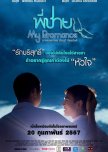
An obsession that haunts human beings: seeing people who hate each other love each other
Golf (Teerapat Lohanan) is an 18-year-old young man who lives in a wealthy house but with a dysfunctional family, whose parents have barely taken care of him. Her mother has died and she now lives with her aunt and her father Vut, who is constantly on business trips and whom she blames for her mother's death.After being orphaned, he has changed his behavior from being an athletic and active young man to behaving aggressively and temperamentally. His friends describe him as a playboy and foul-mouthed. From his father he has only obtained little love and inattention, but a lot of money that does not fulfill his life. Circumstances have caused Golf to feel resentful towards his ancestor and this animosity has an impact on his personal and student life.
The Thai film 'My Bromance' ("พี่ชาย My Bromance", Phi Chai My Bromance) revolves around this axis, filmed in 2013 and released on February 20, 2014, which tells the moving story of two teenage stepbrothers who go from hating each other. to love each other passionately against all odds.
Set in Chiang Mai, this romantic youth drama with a BL and LGBT theme, has its turning point when Bank (Sripinta Pongsatorn), a gentle, kind and sweet-tempered young man, ends up moving to Golf's house, since the father of He and Thara (Chiangmai), his mother, have just gotten married.
Bank, a teenager four months younger than Golf, hopes to be accepted into his new family. However, his new stepbrother will make his life impossible, as he does not accept his father's new marriage or the fact that he now has a younger brother.
Directed by Nitchapoom Chaianun, the film follows the toxic and sentimental relationship that arises between these two young high school students who, due to their parents' marriage, begin to live under the same roof as "brothers." Despite initially teasing Bank, he and Golf can't help but get closer. Before accepting each other as stepbrothers, they must learn the art of living together, overcoming environmental obstacles and falling in love little by little. Will the feelings of love between siblings grow beyond that?
However, despite the abyss that separates them because they are socially considered "brothers" and their enormous differences in characters and personalities, both will begin to feel an irresistible attraction that will soon become pure fire and unbridled passion. Neither the continuous rivalry between the two nor the opposition of those around them will be able to prevent them from ending up lost and secretly in love, which will put their forbidden love to the test.
The synopsis of the film already tells us several keys to success, as previously demonstrated in other filmographies and generations 'Grease', 'My Fault' or 'Three Meters Above Heaven'. A teenage romance with hints of forbidden love on all sides, first because the family members resist the idea of the boys being homosexual and, secondly, the refusal to accept that both violate their status as "brothers."
Marked on the component "hate and love, between which there is but one step", the film narrates an obsession that haunts human beings: seeing people who hate each other love each other.
The chemistry between Golf and Bank is super special, it transcends the screen, and is totally enjoyable and emotionally impactful. It is a very passionate story of young love, which is the most intense, and above all loaded with a lot of action, in addition to being very visually beautiful.
If there is something that really stands out in 'My Bromance' it is the team formed by Teerapat Lohanan and Sripinta Pongsatorn, who give us great performances of their characters and share enormous chemistry on the big screen.
The first, within his leading role, performs a masterful characterization of Golf, taking into account that it is a complex interpretation on a psychological level. Perhaps at first he seems to us only a young man marked by the circumstances that have led him to disrupt his own life and he shows us an obsessive and somewhat egocentric and even selfish personality by not accepting his father's new relationship, which is why he comes to hate his stepbrother, but how with the passing of the minutes a change occurs in him that floods us with inspiration and hope.
Refusing to issue a single spoiler, it remains to say that the film has continuity in 'My Bromance: Reunion' (2015), 'My Bromance' (Channel 9/Line TV, 2016) and 'My Bromance 2: 5 Years Later' ( Line TV, 2020). About these related titles… we will be talking soon.

 1
1
















